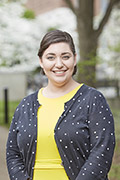 Amber Banks, Class of 2020, is one of eight law students honored by Equal Justice Works with its 2020 Regional Public Interest Award. Equal Justice Works is a national nonprofit organization that facilitates opportunities for lawyers and law students to engage in public service.
Amber Banks, Class of 2020, is one of eight law students honored by Equal Justice Works with its 2020 Regional Public Interest Award. Equal Justice Works is a national nonprofit organization that facilitates opportunities for lawyers and law students to engage in public service.
“We are delighted to recognize Amber for her outstanding service and active participation in the law student community at Vanderbilt,” said Aoife Delargy Lowe, director of law school engagement and advocacy at Equal Justice Works. “She has a clear passion for public interest law as shown in her work both on campus and in the community.”
Banks was a Garrison Social Justice Scholar at Vanderbilt. She spent summer 2018 working at the Texas Civil Rights Project, where she focused on criminal justice reform and voting rights, and summer 2019 working at the Southern Poverty Law Center in Jackson, Mississippi, focusing on children’s rights and education issues. She interned at the ACLU of Tennessee and joined the Stanton Foundation First Amendment Clinic, where her work involved voting rights restoration, free speech, civil asset seizure, reproductive rights and unsealing court documents.
Banks served as executive editor of the Vanderbilt Journal of Entertainment and Technology Law and won the Scholastic Excellence Award in Criminal Procedure. She was president of If/When/How: Lawyering for Reproductive Justice, vice president of the Law Students for Social Justice, and secretary of the American Constitution Society.
She was honored by her classmates with the Class of 2020 Philip G. Davidson Award, presented to the graduate “chosen by the Vanderbilt Bar Association Board of Governors, who is dedicated to the law and its problem-solving role in society, and who provides exemplary leadership in service to the Law School and the greater community.”
“I think it is our responsibility to challenge injustice in whatever way we can,” Banks said. “I plan to use the skills I learn at Vanderbilt Law to challenge oppressive systems in this country and to assist disadvantaged people and communities.”